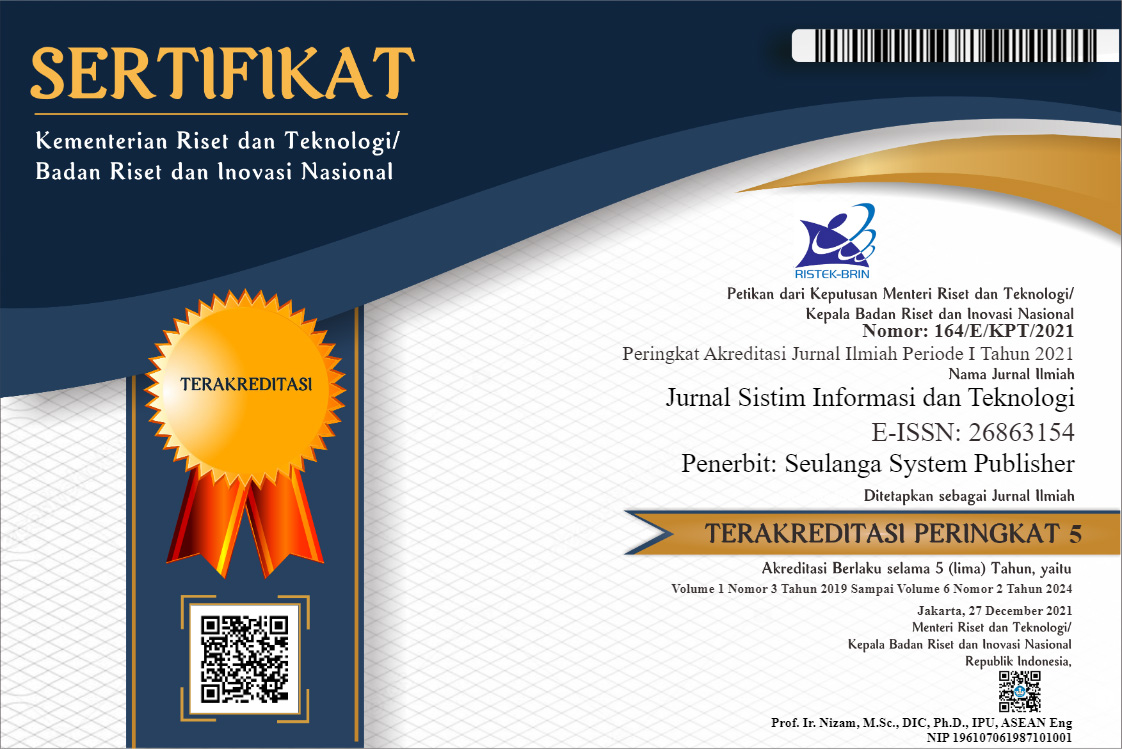Sistem Pakar dalam Mengidentifikasi Gejala Stroke Menggunakan Metode Naive Bayes
DOI:
https://doi.org/10.37034/jsisfotek.v3i4.69Keywords:
Expert System, Identification, Symptom, Stroke, Naive BayesAbstract
Stroke is a disease caused by brain damage caused by disruption of the blood supply to the brain. At this time in general, people are still not very familiar with how this stroke disease or do not realize the symptoms that may have appeared from the start. People also tend to be hesitant to visit the hospital to check their symptoms and feel they are delaying further examinations. This is certainly a scourge that continues to make the number of strokes increase. In assisting the community in identifying stroke disease, an expert system is needed that is able to identify the type of stroke based on the symptoms felt. The data used in this study were obtained from Brain Hospital. Dr. Drs. M. Hatta Bukittinggi which was later developed into a website-based system using the PHP Framework Laravel programming language and MySQL as the database. The system is built based on the Naive Bayes method which is one of the Expert System methods that has a high accuracy value. The use of this system is expected to be able to provide knowledge to the public about the symptoms that might lead to what type of stroke the user might suffer, so that the user can use the results of the system as a reference to visit the hospital and immediately get more targeted help. This system can perform calculations that match the results of the doctor's diagnosis with an accuracy value of 100% in identifying the type of stroke from 10 data samples used.
References
Byna, A., & Basit, M. (2020). Penerapan Metode Adaboost untuk Mengoptimasi Prediksi Penyakit Stroke dengan Algoritma Naive Bayes. Jurnal Sisfokom (Sistem Informasi Dan Komputer, 9(3), 407–411. http://doi.org/10.32736/sisfokom.v9i3.1023
Alchuriyah, S., & Wahjuni, C. U. (2016). The Factors that Affect Stroke at Young Age in Brawijaya Hospital Surabaya. Jurnal Berkala Epidemiologi, 4(1), 62. https://doi.org/10.20473/jbe.v4i1.2016.62-73
Luthvan, D. (2019). Diagnosis Penyakit Diabetes pada Masyarakat Awam Menggunakan Metode Backward Chaining. Jurnal Sistim Informasi Dan Teknologi, 1(4), 43–51. https://doi.org/10.35134/jsisfotek.v1i4.14
Yuliyana, Y., & Sinaga, A. S. R. M. (2019). Sistem Pakar Diagnosa Penyakit Gigi Menggunakan Metode Naive Bayes. Fountain of Informatics Journal, 4(1), 19. https://doi.org/10.21111/fij.v4i1.3019
Geetha, G., & Prasad, K. Mohana. (2020). Prediction of Diabetics using Machine Learning. IJITEE (International Journal of Innovative Technology and Exploring Engineering), 8(5), 1119–1124. https://doi.org/10.35940/ijrte.e6290.018520
Zohra, F. T. (2020). Prediction of Different Diseases and Development of a Clinical Decision Support System using Naive Bayes Classifier. International Journal for Research in Applied Science and Engineering Technology, 8(5), 8–13. https://doi.org/10.22214/ijraset.2020.5002
Minarni, M., & Irawan, P. (2019). Implementasi Metode Naive Bayes untuk Diagnosa Penyakit Lambung. Jurnal TeknoIf, 7(2), 115. https://doi.org/10.21063/jtif.2019.v7.2.115-123
Sudha, M., & Poorva, B. (2019). Predictive Tool for Dermatology Disease Diagnosis using Machine Learning Techniques. IJITEE (International Journal of Innovative Technology and Exploring Engineering), 8(9), 355–360. https://doi.org/10.35940/ijitee.g5376.078919
Devita, R. N., Herwanto, H. W., & Wibawa, A. P. (2018). Perbandingan Kinerja Metode Naive Bayes dan K-Nearest Neighbor untuk Klasifikasi Artikel Berbahasa indonesia. Jurnal Teknologi Informasi Dan Ilmu Komputer, 5(4), 427. https://doi.org/10.25126/jtiik.201854773
Riani, A., Susianto, Y., & Rahman, N. (2019). Implementasi Data Mining Untuk Memprediksi Penyakit Jantung Mengunakan Metode Naive Bayes. Journal of Innovation Information Technology and Application (JINITA), 1(01), 25–34. https://doi.org/10.35970/jinita.v1i01.64
S A, S. (2021). Comparative Study of Naive Bayes, Gaussian Naive Bayes Classifier and Decision Tree Algorithms for Prediction of Heart Diseases. International Journal for Research in Applied Science and Engineering Technology, 9(3), 475–486. https://doi.org/10.22214/ijraset.2021.33228
Deka, D. (2020). Detection of Congestive Heart Failure using Naive Bayes Classifier. International Journal of Engineering and Advanced Technology (IJEAT), 9(3), 4154–4159. https://doi.org/10.35940/ijeat.c6623.029320
Perbawawati, A. A., Sugiharti, E., & Muslim, M. A. (2019). Bayes Theorem and Forward Chaining Method On Expert System for Determine Hypercholesterolemia Drugs. Scientific Journal of Informatics, 6(1), 116–124. https://doi.org/10.15294/sji.v6i1.14149
Silahudin, D., Henderi, & Holidin, A. (2020). Model Expert System for Diagnosis of Covid-19 Using Naive Bayes Classifier. IOP Conference Series: Materials Science and Engineering, 1007, 012067. https://doi.org/10.1088/1757-899x/1007/1/012067
Marathe, N., Gawade, S., & Kanekar, A. (2021). Prediction of Heart Disease and Diabetes Using Naive Bayes Algorithm. International Journal of Scientific Research in Computer Science, Engineering and Information Technology, 447–453. https://doi.org/10.32628/cseit217399
Ervinaeni, Y., Hidayat, A. S., & Riana, E. (2019). Sistem Pakar Diagnosa Gangguan Hiperaktif Pada Anak Dengan Metode Naive Bayes Berbasis Web. Jurnal Media Informatika Budidarma, 3(2), 90. https://doi.org/10.30865/mib.v3i2.1158
Ertuncay, D., & Costa, G. (2021). Determination of near-fault impulsive signals with multivariate naïve Bayes method. Natural Hazards, 108(2), 1763–1780. https://doi.org/10.1007/s11069-021-04755-0
Putra, D. W. T., Utami, A. O., Minarni, & Swara, G. Y. (2019). Accuracy Level of Diagnosis of ENT Diseases in Expert System. Jurnal KomtekInfo, 6(2), 127–134. https://doi.org/10.35134/komtekinfo.v6i2.51









